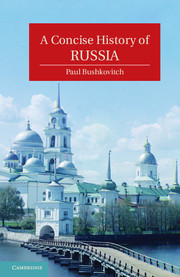Book contents
- Frontmatter
- Contents
- List of Figures
- Abbreviations
- Acknowledgments
- Prologue
- 1 Russia before Russia
- 2 Moscow, Novgorod, Lithuania, and the Mongols
- 3 The Emergence of Russia
- 4 Consolidation and Revolt
- 5 Peter the Great
- 6 Two Empresses
- 7 Catherine the Great
- 8 Russia in the Age of Revolution
- 9 The Pinnacle of Autocracy
- 10 Culture and Autocracy
- 11 The Era of the Great Reforms
- 12 From Serfdom to Nascent Capitalism
- 13 The Golden Age of Russian Culture
- 14 Russia as an Empire
- 15 Autocracy in Decline
- 16 War and Revolution
- 17 Compromise and Preparation
- 18 Revolutions in Russian Culture
- 19 Building Utopia
- 20 War
- 21 Growth, Consolidation, and Stagnation
- 22 Soviet Culture
- 23 The Cold War
- Epilogue
- Further Reading
- Index
23 - The Cold War
Published online by Cambridge University Press: 05 June 2012
- Frontmatter
- Contents
- List of Figures
- Abbreviations
- Acknowledgments
- Prologue
- 1 Russia before Russia
- 2 Moscow, Novgorod, Lithuania, and the Mongols
- 3 The Emergence of Russia
- 4 Consolidation and Revolt
- 5 Peter the Great
- 6 Two Empresses
- 7 Catherine the Great
- 8 Russia in the Age of Revolution
- 9 The Pinnacle of Autocracy
- 10 Culture and Autocracy
- 11 The Era of the Great Reforms
- 12 From Serfdom to Nascent Capitalism
- 13 The Golden Age of Russian Culture
- 14 Russia as an Empire
- 15 Autocracy in Decline
- 16 War and Revolution
- 17 Compromise and Preparation
- 18 Revolutions in Russian Culture
- 19 Building Utopia
- 20 War
- 21 Growth, Consolidation, and Stagnation
- 22 Soviet Culture
- 23 The Cold War
- Epilogue
- Further Reading
- Index
Summary
The Cold War lasted for the whole of the last forty-six years of Soviet history. It was an epic contest, ranging over the whole world, from Berlin and Peking to the most distant parts of Africa and Latin America. For much of the time the Soviet Union seemed to have a good chance of “winning” in some form, and indeed the more hysterical of its opponents were convinced that it was immensely powerful. In reality, the Soviet Union came from behind in the struggle and was never close to defeating its new enemy, the United States. For most of the time, it struggled just to keep up and survive with its newfound power more or less intact.
At the end of the Second World War the two new powers seemed relatively evenly matched, for both were industrial powers and similar in population, the United States at 151 million and the Soviet Union at 182 million. The population figures were an illusion, however, for the Soviet figure was the result of concealment of war losses and may have been as low as 167 million. Soviet industry, however, had been only third in 1940 behind the United States and Germany and much of it was now in ruins. The devastation of the country was unparalleled, even in Germany, and the United States had suffered no war damage at all, outside of Pearl Harbor and the Aleutian Islands. The war had restored American prosperity after the Depression and was a huge boost to American technology and industry, as the rapid success of the atomic project demonstrated. At the time Stalin was convinced that after the war the “contradictions” between the United States and other Western powers would grow, especially as he anticipated a rapid recovery and rearmament of Germany and Japan. Eventually there could be another war among the Western powers. Some in the Soviet hierarchy questioned this view, pointing out that England, for all its differences with the United States, was fundamentally dependent on American money and power, and so would be Germany and Japan. Stalin simply suppressed such dissent.
Information
- Type
- Chapter
- Information
- A Concise History of Russia , pp. 429 - 446Publisher: Cambridge University PressPrint publication year: 2011
